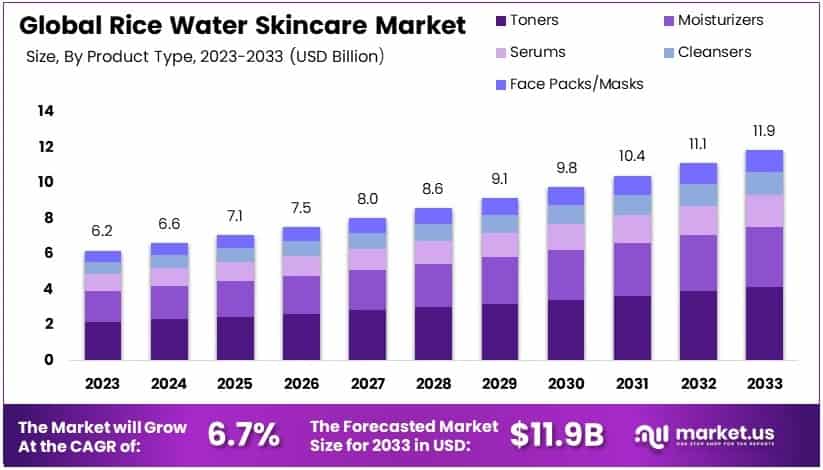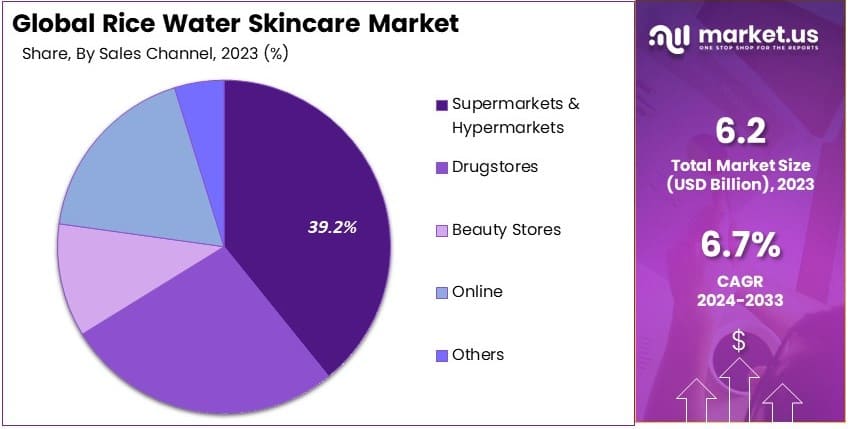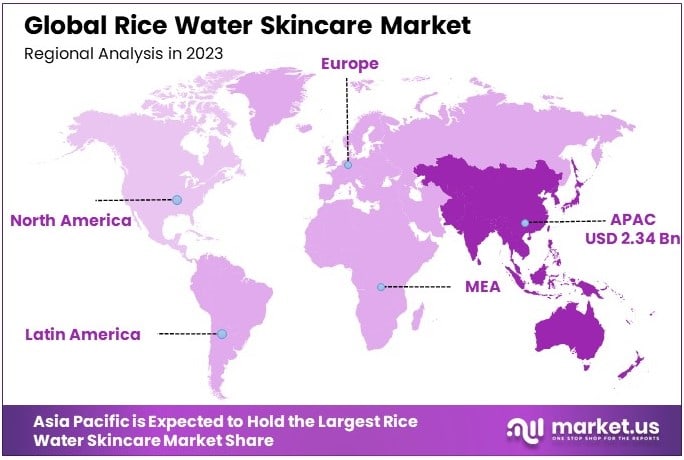Global Rice Water Skincare Market Report By Product Type (Toners, Moisturizers, Serums, Cleansers, Face Packs/Masks, Other Skincare Products), By Skin Type (Oily, Dry, Combination, Other Skin Types), By End User (Men, Women, Unisex), By Sales Channel (Supermarkets & Hypermarkets, Drugstores, Beauty Stores, Online, Others), By Region and Companies - Industry Segment Outlook, Market Assessment, Competition Scenario, Trends and Forecast 2024-2033
- Published date: Nov 2024
- Report ID: 132170
- Number of Pages: 226
- Format:
-
keyboard_arrow_up
Quick Navigation
Report Overview
The Global Rice Water Skincare Market size is expected to be worth around USD 11.9 Billion by 2033, from USD 6.2 Billion in 2023, growing at a CAGR of 6.7% during the forecast period from 2024 to 2033.
Rice water skincare refers to beauty products that incorporate rice water as a key ingredient. Known for its soothing and hydrating properties, rice water has been used in traditional skincare routines, particularly in East Asia. It gently nourishes the skin, making it suitable for various skin types, including sensitive and oily skin.
The rice water skincare market encompasses the production and sale of products like toners, serums, and cleansers that harness the benefits of rice water. This market is driven by the popularity of natural and gentle skincare solutions, with a particular focus on hydration, firmness, and texture enhancement. Demand is growing as consumers seek plant-based and effective skincare options.

Growing awareness of skin health has contributed significantly to the popularity of rice water skincare. A recent CeraVe survey reveals that 80% of U.S. adults experience skin health issues, and 25% report more severe concerns. However, only 40% seek annual dermatology check-ups, indicating a lack of proactive skin health management. Barriers like long wait times (27%) and limited dermatologist availability (18%) further highlight this unmet need.
Products featuring rice water, including toners and serums, provide multiple benefits. For instance, Korean beauty brand Beauty of Joseon incorporates 78% rice water in its toner formulations to address skin dullness and dehydration. This high concentration has gained attention for its ability to improve skin texture, thus attracting consumers who prioritize visible, natural results.
On a broader scale, the demand for natural cosmetic ingredients in skincare products is pushing the rice water skincare market forward. As consumer interest in plant-based products rises, brands are responding with innovative formulations to capture this expanding market. Market saturation remains low, providing ample room for new entrants focused on natural and gentle solutions.
Locally, rice water skincare has garnered popularity in both mainstream and specialty beauty retailers. Its presence has expanded significantly, particularly in regions where consumers show a preference for K-beauty and plant-based formulations. This localized popularity reflects the global shift toward accessible, natural skincare that delivers on hydration and texture.
Key Takeaways
- The Rice Water Skincare Market was valued at USD 6.2 billion in 2023 and is anticipated to reach USD 11.9 billion by 2033, growing at a CAGR of 6.7%.
- In 2023, Moisturizers dominate the product type segment with 24.8%, driven by their hydrating properties.
- In 2023, Dry Skin holds the largest market share in skin type at 26.9%, reflecting demand for moisture-rich products.
- In 2023, Female end-users dominate with 74.9%, supported by rising preferences for natural skincare.
- In 2023, Supermarkets & Hypermarkets lead the sales channel with 39.2%, providing convenience and accessibility.
- In 2023, Asia-Pacific holds the largest regional share at 37.8%, driven by the popularity of traditional skincare in the region.
Product Type Analysis
Moisturizers Dominate with 24.8% Due to High Demand for Hydration Solutions
In the Rice Water Skincare Market, Moisturizers hold the largest share, dominating with 24.8%. This prominence is driven by the high efficacy of rice water in providing deep hydration and improving skin barrier function, making moisturizers especially popular among consumers seeking effective hydration solutions.
Toners, another significant product type, incorporate rice water for its soothing and clarifying properties, helping to refine skin texture and minimize pores. Serums enriched with rice water are favored for their concentrated nutrients, which target specific skin concerns like dullness and uneven tone.
Cleansers and Face Packs/Masks also play essential roles, with the former offering gentle cleansing benefits suitable for all skin types, and the latter providing intensive treatment options to rejuvenate and nourish the skin. Other skincare products, including exfoliants and eye creams, contribute to the market by addressing additional skin care needs with the benefits of rice water.
Skin Type Analysis
Dry Skin Leads with 26.9% Due to Rice Water’s Intensive Moisturizing Properties
The segment by “Skin Type” is led by products designed for Dry Skin, which accounts for 26.9% of the market. Rice water is highly beneficial for dry skin due to its moisturizing properties, helping to alleviate dryness and flakiness without causing irritation. This makes rice water-based skincare products particularly appealing to individuals with dry skin, as they provide long-lasting hydration and improve skin elasticity.
Products for Oily Skin are formulated to balance oil production while providing hydration, capitalizing on rice water’s ability to refine pores and mattify the skin.
Combination Skin types benefit from rice water’s versatility in addressing both dry and oily areas effectively, making it an ideal ingredient for balancing products. Other Skin Types, including sensitive and mature skin, also find suitable solutions in rice water skincare products due to their gentle and nourishing properties.
End User Analysis
Women Dominate the Market with 74.9% Due to High Consumer Engagement
In the “End User” segment, products targeting Women dominate, capturing 74.9% of the market. This significant figure reflects the higher engagement of female consumers in skincare, particularly in exploring products that offer both traditional and modern beauty benefits like those provided by rice water.
Women are typically more proactive in skincare purchases, especially for products that promise enhanced hydration and natural care, which are key attributes of rice water skincare.
Men’s skincare products featuring rice water are developing but still occupy a smaller portion of the market. These products often focus on simplicity and multi-functionality, appealing to men who prefer straightforward skincare routines. Unisex products are also available and are gaining popularity as they cater to all genders, emphasizing the universal benefits of rice water for skin health and maintenance.
Sales Channel Analysis
Supermarkets & Hypermarkets Lead with 39.2% Owing to Wide Consumer Reach
Within the “Sales Channel” segment, Supermarkets & Hypermarkets lead with a 39.2% share in the Rice Water Skincare Market. This dominance is due to their extensive reach and ability to offer a wide variety of skincare products under one roof. Consumers appreciate the convenience of comparing and purchasing a broad range of skincare items during their routine shopping trips, making these venues highly popular for buying skincare products.
Drugstores are a key channel, particularly for consumers seeking pharmaceutical-grade skincare products with rice water. Beauty Stores provide a curated selection of premium rice water skincare products, often with expert advice available on-site.
Online sales channels are rapidly growing, favored for their convenience and the wide selection they offer, including exclusive products not available in physical stores. Other channels, including salons and specialty stores, complement the landscape by targeting niche markets with specific skincare needs.

Key Market Segments
By Product Type
- Toners
- Moisturizers
- Serums
- Cleansers
- Face Packs/Masks
- Other Skincare Products
By Skin Type
- Oily
- Dry
- Combination
- Other Skin Types
By End User
- Men
- Women
- Unisex
By Sales Channel
- Supermarkets & Hypermarkets
- Drugstores
- Beauty Stores
- Online
- Others
Drivers
Increasing Consumer Preference for Natural Ingredients Drives Market Growth
The rice water skincare market is experiencing robust growth due to consumers’ increasing preference for natural ingredients. This trend aligns with the broader movement toward clean beauty, where rice water is favored for its minimal processing and naturally derived benefits.
Growing awareness of rice water’s potential skin-enhancing properties, such as hydrating and brightening effects, further propels this trend. The demand for anti-aging products also contributes to the market’s growth, as rice water is often marketed for its purported ability to minimize signs of aging.
Additionally, the expansion of e-commerce platforms allows consumers easier access to rice water-based products, enabling wider market reach and higher consumer engagement. Together, these driving factors strengthen the rice water skincare market by attracting health-conscious consumers and enhancing product availability across global markets.
Restraints
Limited Scientific Research and Evidence Restrains Market Growth
The rice water skincare market faces growth limitations due to restricted scientific research and limited empirical support for its claimed benefits. Many consumers remain cautious about rice water products due to a lack of substantial evidence, reducing widespread adoption.
High competition from well-established skincare brands with proven track records further constrains market expansion, as consumers often favor trusted, researched brands over newer products. Product formulation and preservation challenges also restrain the market, as rice water’s natural composition can complicate long-term shelf stability without preservatives, impacting product quality.
Additionally, the higher costs of rice water-based skincare can deter price-sensitive customers, especially in highly competitive markets. These restraining factors collectively present significant hurdles, limiting potential market growth and consumer conversion rates.
Opportunity
Growing Interest in DIY Skincare Trends Provides Opportunities
The rising interest in DIY skincare presents substantial opportunities for the rice water skincare market. Consumers increasingly explore home-based skincare solutions, and rice water, known for its versatility, fits well into this trend.
The expansion in emerging markets, where traditional beauty practices are highly regarded, offers further growth potential for rice water products, leveraging cultural preferences. Korean beauty’s global influence also supports rice water products, as they are frequently featured in K-beauty regimens.
Additionally, there is a rising demand for organic and vegan cosmetics product, which positions rice water-based items well within clean and ethical beauty categories. These factors together provide significant growth opportunities for brands to innovate and capture market interest across diverse consumer segments.
Challenges
Stringent Regulatory Requirements Challenge Market Growth
The rice water skincare market encounters challenges from stringent regulatory requirements, especially in regions with rigorous cosmetic safety standards. Compliance with these regulations often incurs high costs and prolongs product launch timelines, limiting market responsiveness.
Supply chain constraints for natural ingredients, such as sourcing high-quality rice water, also pose challenges, impacting production capabilities. Consumer skepticism toward unverified claims further hinders market growth, as many consumers demand scientific backing for skincare products.
Additionally, the increasing demand for sustainable packaging creates an added layer of complexity, requiring brands to invest in eco-friendly packaging solutions. These challenges create operational and compliance obstacles, affecting the overall scalability of rice water skincare products.
Growth Factors
Increased Investment in Research and Development Are Growth Factors
Growth in the rice water skincare market is also driven by increased investment in research and development. Companies are dedicating resources to scientifically validate rice water’s benefits, appealing to consumers who value evidence-based skincare.
The growing market for anti-aging products aligns well with rice water’s positioning, as it is marketed for hydration and rejuvenation. Health and wellness awareness further support this growth, as consumers increasingly seek skincare options that complement their holistic lifestyle choices.
Additionally, the expansion of the clean beauty segment has fueled demand for rice water products, as they align with consumer preferences for minimal and naturally sourced ingredients.
Emerging Trends
Influencer Marketing and Social Media Trends Are Latest Trending Factor
Social media trends and influencer marketing have become significant drivers in the rice water skincare market. With influencers highlighting rice water products across platforms, consumer interest and market visibility have surged.
The focus on skin microbiome health, a trending skincare approach, also enhances rice water’s appeal, as it is often perceived as gentle and beneficial for skin balance. Personalized skincare solutions are another popular trend, where rice water-based products are customized for specific skin types and concerns.
Additionally, the minimalist skincare routine is gaining traction, promoting rice water for its simplicity and natural origins. Together, these trending factors attract a digital-savvy audience, boosting market growth by increasing brand awareness and fostering product loyalty.
Regional Analysis
Asia-Pacific Dominates with 37.8% Market Share
Asia-Pacific leads the Rice Water Skincare Market, holding a 37.8% share valued at USD 2.34 billion. This dominance is attributed to the cultural significance of rice water in traditional skincare routines, especially in countries like Japan and South Korea. High demand for natural and organic products further drives the region’s market position.
The market dynamics in Asia-Pacific benefit from a strong consumer preference for herbal and plant-based skincare solutions. High awareness of skincare benefits associated with rice water, combined with effective marketing by leading brands, fuels widespread adoption. Moreover, regional beauty trends, particularly K-beauty, popularize rice water-based products globally, reinforcing Asia-Pacific’s leadership.

Regional Mentions:
- North America: North America is an emerging market for rice water skincare, driven by rising interest in natural beauty solutions. Increasing consumer awareness of the benefits of rice water for skin health supports market growth, particularly in the United States.
- Europe: Europe sees steady growth in the rice water skincare market as consumers seek eco-friendly and natural products. Countries like Germany and France lead in demand, with brands emphasizing clean beauty and transparent ingredient sourcing.
- Middle East & Africa: The Middle East and Africa are showing growing interest in rice water skincare, driven by rising consumer preference for organic and effective skincare solutions. Market growth is gradual as awareness expands across key countries.
- Latin America: Latin America presents emerging opportunities for rice water skincare, particularly in Brazil and Argentina. Growing trends in natural and sustainable beauty drive consumer interest, with brands focusing on expanding accessibility and product variety in this region.
Key Regions and Countries covered іn thе rероrt
- North America
- US
- Canada
- Europe
- Germany
- France
- The UK
- Spain
- Italy
- Rest of Europe
- Asia Pacific
- China
- Japan
- South Korea
- India
- Australia
- Rest of APAC
- Latin America
- Brazil
- Mexico
- Rest of Latin America
- Middle East & Africa
- South Africa
- Saudi Arabia
- UAE
- Rest of MEA
Key Players Analysis
The Rice Water Skincare Market is shaped by leading beauty brands that focus on natural ingredients, heritage-inspired formulas, and luxury skincare experiences. The top players—Tatcha, SK-II, Innisfree, and The Face Shop—stand out with their specialized rice water skincare products, catering to consumers seeking hydration, brightness, and overall skin wellness through gentle, effective solutions.
Tatcha is celebrated for its luxury, Japanese-inspired skincare products that incorporate rice water as a key ingredient. Known for using natural and high-quality formulations, Tatcha targets consumers looking for gentle, hydrating solutions. Its emphasis on purity and traditional beauty rituals has earned Tatcha a loyal following, particularly among those seeking premium skincare.
Innisfree, a leading brand in K-beauty, is known for its eco-friendly and natural approach to skincare. By incorporating rice water into its formulations, Innisfree provides affordable, effective solutions that appeal to environmentally conscious consumers. With its sustainable sourcing and gentle formulations, Innisfree has established itself as a go-to brand for natural skincare enthusiasts.
The Face Shop also taps into traditional skincare ingredients like rice water to offer brightening and moisturizing benefits. Known for accessible pricing and a broad product range, The Face Shop caters to a wide demographic. Its use of rice water, combined with effective formulas, reinforces its position as a leading skincare brand in Asia and beyond.
These key players shape the rice water skincare market by offering consumers a blend of tradition, innovation, and quality. Their commitment to natural ingredients and customer satisfaction helps set industry standards in this growing segment, meeting the rising demand for gentle, nature-based skincare.
Top Key Players in the Market
- Tatcha
- SK-II
- Innisfree
- The Face Shop
- AmorePacific
- Cosrx
- Laneige
- TonyMoly
- Soko Glam
- Nature Republic
- Dear, Klairs
- Missha
- Sulwhasoo
- Herbivore Botanicals
- Glow Recipe
Recent Developments
- WishCare: In June 2022, Kolkata-based entrepreneurs Stuti and Ankit Kothari launched WishCare, a natural skincare brand focused on products made with fermented rice water. Their offerings, including hair oils, shampoos, conditioners, and hair masks, are priced between ₹400 and ₹500. The brand has achieved significant growth, processing around 100,000 orders monthly.
- KinKind: In September 2024, KinKind expanded its retail presence by introducing four plastic-free shampoo and conditioner bars in Ocado. These products, formulated with rice water protein, align with KinKind’s mission to promote sustainable hair care solutions. This launch also supports Ocado’s Planet Together strategy, which emphasizes environmentally friendly consumer choices.
Report Scope
Report Features Description Market Value (2023) USD 6.2 Billion Forecast Revenue (2033) USD 11.9 Billion CAGR (2024-2033) 6.7% Base Year for Estimation 2023 Historic Period 2019-2022 Forecast Period 2024-2033 Report Coverage Revenue Forecast, Market Dynamics, Competitive Landscape, Recent Developments Segments Covered By Product Type (Toners, Moisturizers, Serums, Cleansers, Face Packs/Masks, Other Skincare Products), By Skin Type (Oily, Dry, Combination, Other Skin Types), By End User (Men, Women, Unisex), By Sales Channel (Supermarkets & Hypermarkets, Drugstores, Beauty Stores, Online, Others) Regional Analysis North America – US, Canada; Europe – Germany, France, The UK, Spain, Italy, Rest of Europe; Asia Pacific – China, Japan, South Korea, India, Australia, Singapore, Rest of APAC; Latin America – Brazil, Mexico, Rest of Latin America; Middle East & Africa – South Africa, Saudi Arabia, UAE, Rest of MEA Competitive Landscape Tatcha, SK-II, Innisfree, The Face Shop, AmorePacific, Cosrx, Laneige, TonyMoly, Soko Glam, Nature Republic, Dear, Klairs, Missha, Sulwhasoo, Herbivore Botanicals, Glow Recipe Customization Scope Customization for segments, region/country-level will be provided. Moreover, additional customization can be done based on the requirements. Purchase Options We have three licenses to opt for: Single User License, Multi-User License (Up to 5 Users), Corporate Use License (Unlimited User and Printable PDF) 
-
-
- Tatcha
- SK-II
- Innisfree
- The Face Shop
- AmorePacific
- Cosrx
- Laneige
- TonyMoly
- Soko Glam
- Nature Republic
- Dear, Klairs
- Missha
- Sulwhasoo
- Herbivore Botanicals
- Glow Recipe










